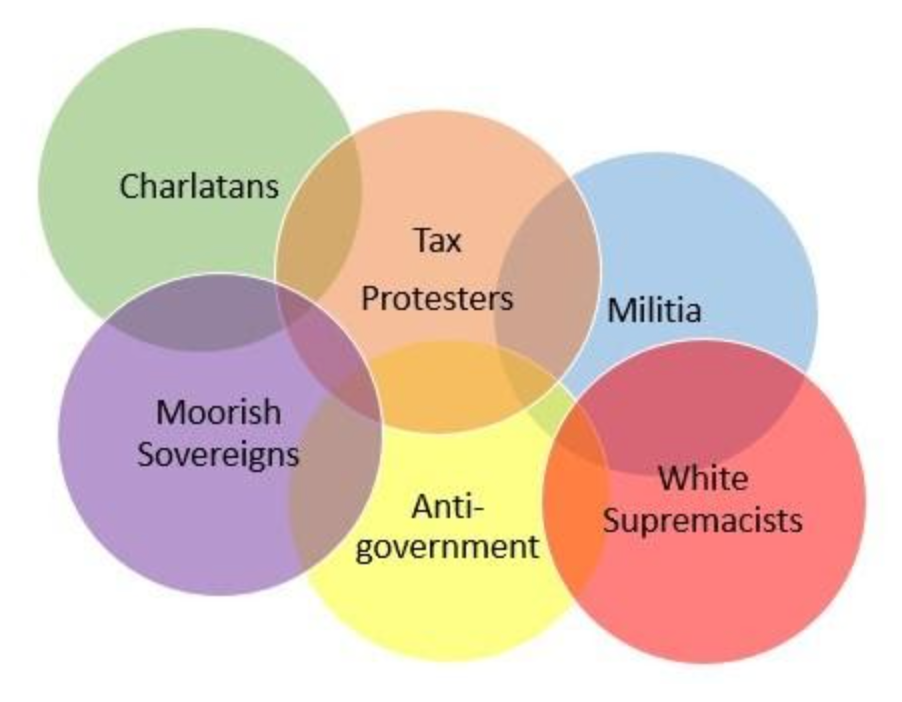How do you talk to someone who denies the legitimacy of the institution you work for? For those of us who work in the public sector, this is not a hypothetical question. As long as government institutions have existed, there have been segments of the population denying their authority. In recent history, poor economic conditions and the ease of spreading misinformation over the Internet have exacerbated anti-government sentiment. Court employees interact with these people on a regular basis, collectively referring to them as “sovereign citizens” in the United States. Sovereign citizens are a loosely organized assortment of people who espouse similar conspiracy theories about the government being illegitimate. Although they can become violent, they usually frustrate courts with vexatious litigation. Because they often represent themselves in court, they take advantage of policies that require judges hold pro se litigants to less stringent standards than those filed by an attorney.
Sovereign citizens pester law enforcement and the judiciary by refusing to abide by the established rules. They often justify their disobedience with discredited interpretations of the law that sound bizarre to everyone else. They claim the legitimate government set up by the Founding Fathers was replaced sometime in the past by one governed by admiralty law and the Uniform Commercial Code. They allege American flags decorated with gold fringe indicate the location is under admiralty jurisdiction, and that government documents which spell their name using ALL CAPITAL letters are referring to a corporate identity that was set up when they were born. These and other pseudo-legal arguments rely on 19th century court opinions taken out of context and definitions from obsolete legal dictionaries and treatises.

Sovereign citizens may not actually believe all of these conspiracy theories. Some of them are just looking to make money from disenfranchised people by selling them bad legal advice. Others are trying to exact revenge on the judges, attorneys and police officers who put them in prison. Whatever their motivation and beliefs, sovereign citizens continue to waste the court’s precious resources.
So, how do you talk to someone who refuses to accept the legitimacy of your parent intuition? Here are a few guidelines researchers on this topic have reported that I can confirm from my experience as a law librarian:
- Remain calm and courteous. The last thing you want to do is reinforce their fear that the government is against them. Offer them help and show them you understand their problem. This will usually prevent your interaction with them from escalating.
- Be firm with them. Be prepared to show them written policies and procedures. If they become aggressive or threatening, call for backup from your superiors and/or security staff.
- Ask them probing questions to get them to see for themselves the fallacy of their logic. Inquire where they got their information from and why they think that source is trustworthy.
For more guidance and information about sovereign citizens movements, see these publications:
Anti-Defamation League, The Lawless Ones: The Resurgence of the Sovereign Citizen Movement 2nd Ed. (2012) Available at https://www.adl.org/sites/default/files/documents/assets/pdf/combating-hate/Lawless-Ones-2012-Edition-WEB-final.pdf
Kalinowski, Caesar IV. A Legal Response to the Sovereign Citizen Movement, 80 Montana Law Review 153 (2019).
Ligon, Mellie. The Sovereign Citizen Movement: A Comparative Analysis with Similar Foreign Movements and Takeaways for the United States Judicial System, 35 Emory International Law Review 297 (2021). Available at https://scholarlycommons.law.emory.edu/eilr/vol35/iss2/4
Loeser C.E. From paper terrorists to cop killers: The sovereign citizen threat. North Carolina Law Review (2015) Available at https://scholarship.law.unc.edu/nclr/vol93/iss4/4/
Meads v. Meads (2012 ABQB 571) Available at https://www.canlii.org/en/ab/abqb/doc/2012/2012abqb571/2012abqb571.html
Phillips, Jessica K. Not All Pro Se Litigants Are Created Equally: Examining the Need for New Pro Se Litigant Classifications through the Lens of the Sovereign Citizen Movement, 29 Georgetown Journal of Legal Ethics (2016).
Southern Poverty Law Center, Sovereign Citizens Movement Available at https://www.splcenter.org/fighting-hate/extremist-files/ideology/sovereign-citizens-movement
Sullivan, Francis X. COMMENT:THE “USURPING OCTOPUS OF JURISDICTIONAL/AUTHORITY”: THE LEGAL THEORIES OF THE SOVEREIGN CITIZEN MOVEMENT, 1999 Wisconsin Law Review 785 Available at https://repository.law.wisc.edu/s/uwlaw/media/18388
Sarteschi, Christine M., “Sovereign citizens: A narrative review with implications of violence towards law enforcement.” Aggression and Violent Behavior 2020 Sep 24 Available at doi 10.1016/j.avb.2020.101509
Weir, Joshua P. “Sovereign Citizens: A Reasoned Response to the Madness,” Lewis & Clark Law Review 19, no. 3 (2015): 829-870
March-Safbom, Terri A. Weapons of mass distraction: strategies for countering the paper terrorism of sovereign citizens (2018) available at https://calhoun.nps.edu/handle/10945/58335
——————————————————————–
Notes Between Us (NBU) is a blog about conversations and topics of interest to the writers. The writers are expressing their personal opinions solely. The essays represent their personal beliefs and not that of their workplaces or any organization they are associated with.
